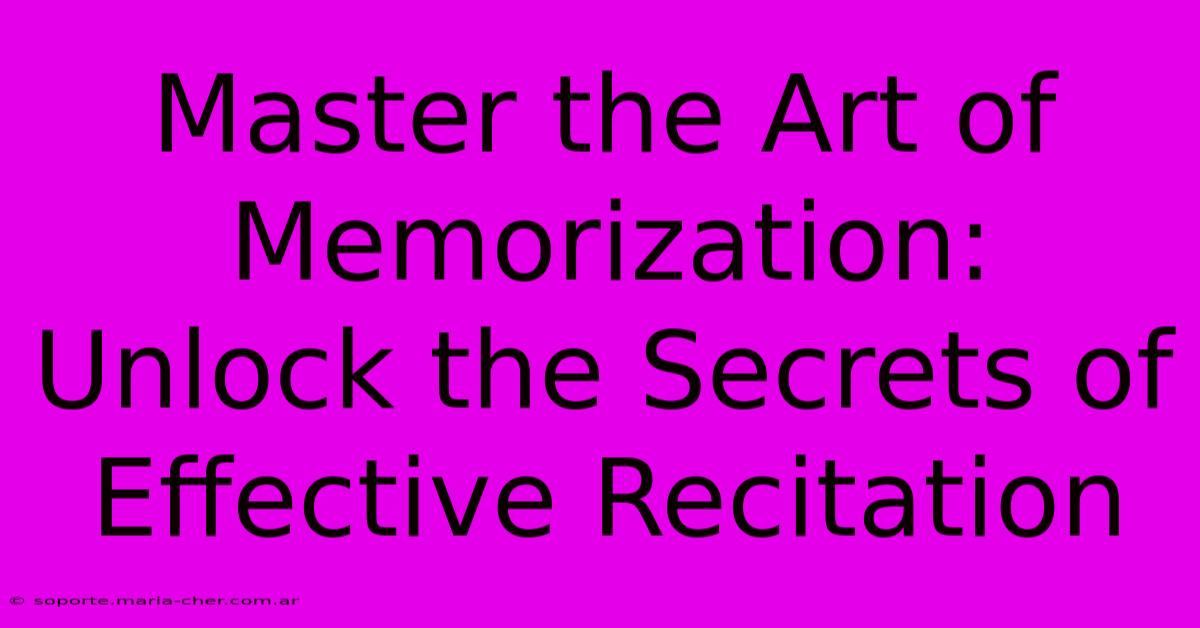Master The Art Of Memorization: Unlock The Secrets Of Effective Recitation

Table of Contents
Master the Art of Memorization: Unlock the Secrets of Effective Recitation
Memorization. The word itself can evoke feelings of dread for some, while others see it as a superpower. But the truth is, memorization is a skill – a learnable, trainable skill that can be mastered with the right techniques. This article will delve into the secrets of effective recitation, equipping you with the tools to unlock your memory's full potential. Whether you're a student cramming for exams, an actor learning lines, or simply someone looking to enhance their cognitive abilities, this guide will help you master the art of memorization.
Understanding How Memory Works
Before diving into techniques, it's crucial to understand the basic principles of memory. Our brains don't work like computers; they don't simply store and retrieve information. Instead, memory involves several stages:
- Encoding: This is the initial stage where information is transformed into a format that the brain can store. Think of it as converting raw data into a usable file.
- Storage: This is the process of retaining the encoded information over time. This stage is influenced by factors like the strength of the initial encoding and the frequency of retrieval.
- Retrieval: This is the process of accessing and bringing the stored information back into conscious awareness. This is where effective recall strategies come in.
Understanding these stages helps us tailor our memorization techniques for optimal effectiveness.
Effective Memorization Techniques: Beyond Rote Learning
Rote learning, the repetitive recitation of information without understanding, is often ineffective and leads to rapid forgetting. Instead, focus on these proven techniques:
1. Spaced Repetition: The Power of Timing
Spaced repetition involves reviewing information at increasing intervals. This combats the forgetting curve, ensuring information remains firmly lodged in your long-term memory. There are apps designed to help with this, but even a simple schedule of review can make a significant difference.
2. Mnemonics: Unleashing Your Creative Memory
Mnemonics are memory aids that use creative strategies to link new information with existing knowledge. Examples include:
- Acronyms: Forming a word from the first letters of a list (e.g., ROY G. BIV for the colors of the rainbow).
- Acrostics: Creating a sentence where the first letter of each word represents an item in a list.
- Visual Imagery: Creating vivid mental images to associate with the information you're trying to remember. The more bizarre and memorable the image, the better.
- Method of Loci (Memory Palace): This technique involves associating items with specific locations in a familiar place, like your house.
3. Chunking: Breaking Down Information
Chunking is the process of grouping information into smaller, manageable units. Instead of trying to memorize a long string of numbers, for example, break it down into smaller chunks. This makes the information easier to process and retain.
4. Active Recall: Test Yourself Regularly
Passive rereading is inefficient. Instead, actively test yourself regularly. Use flashcards, practice quizzes, or simply try to recall the information from memory. This strengthens the neural pathways associated with the information, making it easier to retrieve later.
5. Elaboration: Connecting New Information to Existing Knowledge
Don't just memorize facts in isolation. Connect new information to what you already know. Ask yourself questions, make connections, and build a web of knowledge. This creates a richer and more meaningful understanding, which leads to better retention.
6. Teach It: The Ultimate Test of Understanding
One of the most effective ways to solidify your understanding and memory is to teach the material to someone else. Explaining the concepts forces you to organize your thoughts and identify any gaps in your knowledge.
Boosting Your Memory: Lifestyle Factors
Your memory isn't solely dependent on memorization techniques. Lifestyle factors play a significant role:
- Sleep: Consolidation of memories happens during sleep. Aim for 7-9 hours of quality sleep per night.
- Nutrition: A healthy diet rich in fruits, vegetables, and omega-3 fatty acids supports brain health.
- Exercise: Regular physical activity improves blood flow to the brain, enhancing cognitive function.
- Stress Management: Chronic stress can impair memory. Practice stress-reduction techniques like meditation or yoga.
Conclusion: Mastering Memorization for a Lifetime of Learning
Mastering the art of memorization is not about superhuman abilities; it's about employing effective strategies and understanding how your brain learns. By combining the techniques outlined above with a healthy lifestyle, you can unlock your memory's full potential and achieve greater success in your studies, career, and personal life. Remember, consistent practice is key. Start small, focus on one technique at a time, and gradually build your memorization skills. The rewards are well worth the effort.

Thank you for visiting our website wich cover about Master The Art Of Memorization: Unlock The Secrets Of Effective Recitation. We hope the information provided has been useful to you. Feel free to contact us if you have any questions or need further assistance. See you next time and dont miss to bookmark.
Featured Posts
-
Unlock Studio Quality Photo Editing With Cutout Pro Enhance The Secret Revealed
Feb 10, 2025
-
Unleash Your Inner Adventurer With Our Spellbinding D And D Nail Designs
Feb 10, 2025
-
Bold And Beautiful Unleash The Power Of Dnd Gel Spiced Brown
Feb 10, 2025
-
Sparkle Shimmer Stack The Ultimate Guide To Dazzling Stacked Wedding Rings
Feb 10, 2025
-
Inside The Lavish Lifestyle Of The Highest Paid College Football Coach Mansions Private Jets And More
Feb 10, 2025
